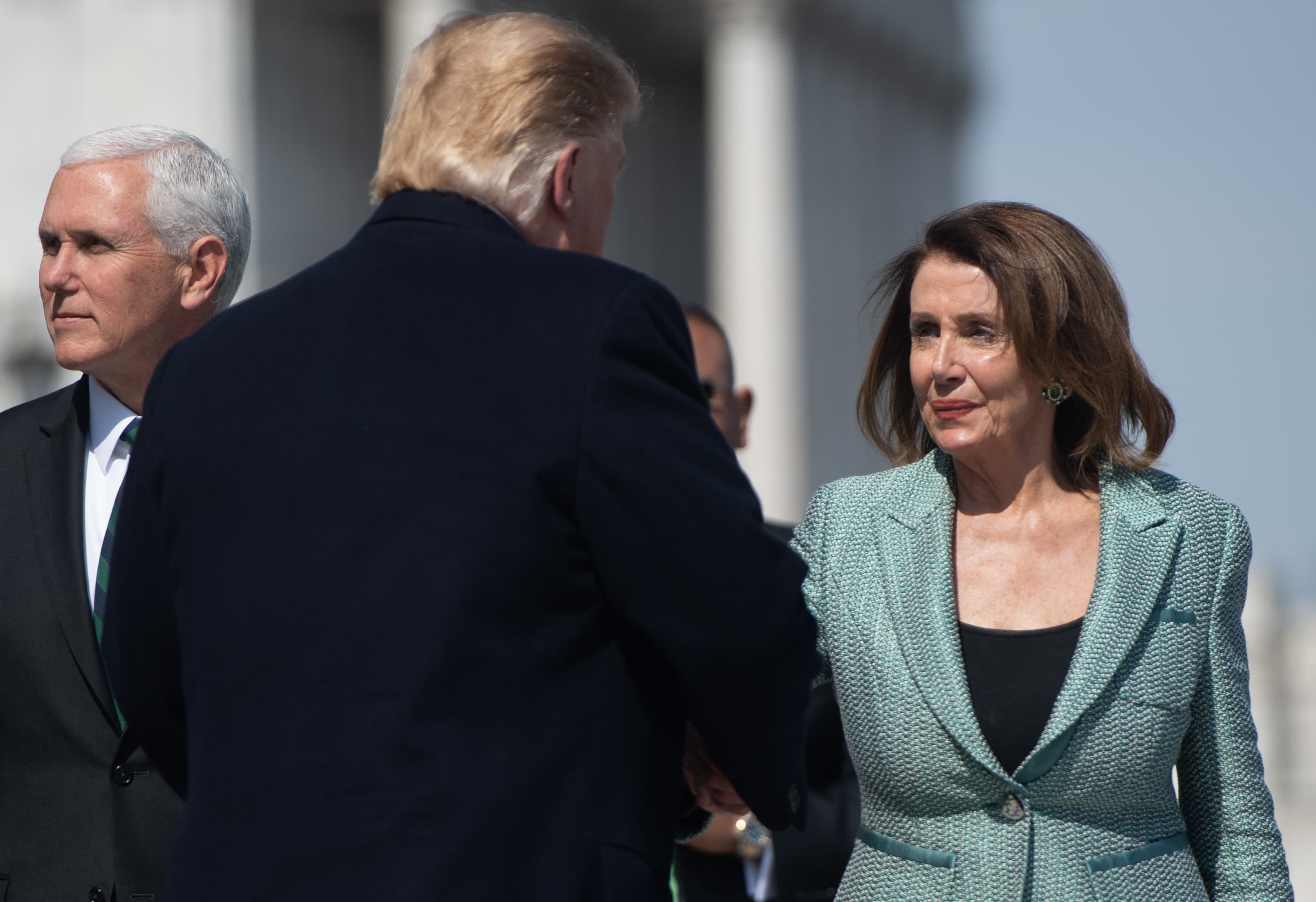Pelosi doubts Trump will strike a trade deal with China this week as tariff hike looms - 4 minutes read

US President Donald Trump shakes hands with Speaker of the House Nancy Pelosi as he departs following the Friends of Ireland Luncheon in honor of Irish Prime Minister Leo Varadkar at the US Capitol in Washington, DC, March 14, 2019.
Saul Loeb | AFP | Getty Images
Nancy Pelosi doubts the Trump administration can strike a trade deal with China this week as a tariff increase looms on Friday.
"No," the House speaker said at a Washington Post Live event Wednesday when asked if she is confident an agreement will happen. "Let me just say that first of all, I never believed that the Chinese were going to honor what they said they were going to do. ... In any trade agreement if you don't have enforcement, all you're having is a conversation, a cup of tea."
The U.S. plans to escalate its trade conflict with Beijing on Friday, when it expects to increase duties on $200 billion in Chinese goods to 25% from 10%. The move comes as the American side cites a lack of progress toward a final agreement to address trade concerns and accuses China of backing out of previous commitments.
The Trump administration hopes it can still make progress when a Chinese delegation led by Vice Premier Liu He heads to Washington for talks on Thursday and Friday. On Wednesday, President Donald Trump tweeted that Chinese negotiators "are now coming to the U.S. to make a deal." But the president added that he is "very happy" with the revenue raised by tariffs, which he called "great" for the U.S. but "not good for China!"
But U.S. consumers largely bear the costs of duties, not China.
Top Democrats have largely backed Trump's efforts to crack down on what officials call Chinese trade abuses, such as intellectual property theft and forced technology transfers. But Washington and Beijing have disagreed over how best to enforce those provisions: Trump wants to at least temporarily leave tariffs in place to force China to uphold its end of an agreement.
The president and Democrats have differed on how best to encourage China to strike a deal to change its practices.
On Wednesday, Pelosi said, "The president is correct in asserting what we have to do with China." However, she said his methods are "empowering them to hurt our people."
The tariffs Trump has put so far on $250 billion in Chinese goods sparked retaliatory duties that helped to send crop prices diving and damaged U.S. farmers. Pelosi contended that, rather than putting tariffs on allies such as the European Union and angering them, Trump should have spared them to increase the leverage the countries could have collectively had over China.
Trump has more enthusiastic support from the top Senate Democrat. After Trump first announced the tariff increase on Sunday, Senate Minority Leader Chuck Schumer, D-N.Y., urged him to "hang tough on China."
The Trump administration has said it would consider delaying Friday's planned tariff increase if talks with Beijing make progress.
But even some Democrats who backed Trump's initial efforts to overhaul trade deals and boost U.S. manufacturing workers have soured on his negotiating tactics with China. Some Democratic lawmakers who supported the president's tariffs on steel and aluminum imports from China have criticized the widening trade conflict.
"President Trump's inability to close a deal with China is hurting our economy," Rep. Tim Ryan, an Ohio Democrat and 2020 presidential candidate, said in a statement. "Businesses need certainty—not a trade war. Our country needs President Trump to finally develop a whole-of-government strategy that holds China accountable and benefits American workers and businesses."
Meanwhile, a spokeswoman for Sen. Sherrod Brown — another skeptic of U.S. trade agreements — said the Ohio Democrat "supports a strong final agreement that leads to long-term structural changes to curb China's cheating." The spokeswoman, Jennifer Donohue, did not immediately answer whether the senator thinks tariffs are the best method of getting to a final agreement.
Subscribe to CNBC on YouTube.